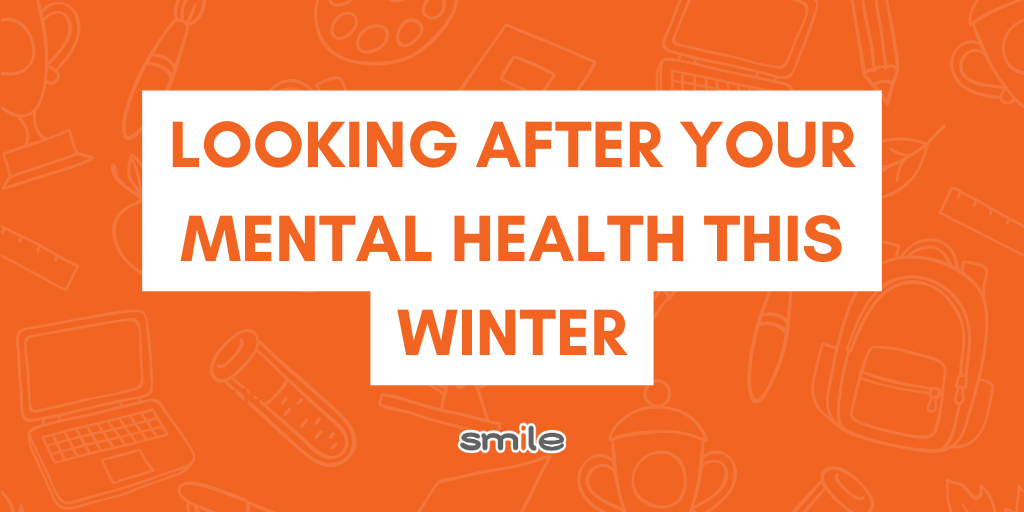Blog
Are you a supply teacher or teaching assistant looking for some help and advice? If so, you are in the right place. Our blogs offer tips and tricks on everything from classroom management to interview tips and support, along with day in the life case studies from real supply teachers, ECTs and cover supervisors. They also give you an insight into what working for Smile is like, the ways which we support local communities and charities and the training and events that we offer.
For more good stuff like this, follow us on social media - you can find us on Facebook, Instagram, Twitter and LinkedIn. Or pick up the phone and give us a call.
The festive season is upon us. While cinemas and Netflix screens are filled with uplifting movies, TV adverts are depicting joyful family gatherings and social media features endless snapshots of people who seem to be having a brilliant time, all too often it’s one of the hardest periods of the year for many.
According to a poll by Skipton Building Society, 3 in 10 Brits claim their mental health is negatively impacted over the Christmas period.
Not only can mental health take a dip in the winter due to seasonal changes, but rising expenses and extra health and work pressures during the festive season can have a knock-on effect, making the festivities difficult to enjoy or just plain impossible.
We know that a lot of the time these issues are much bigger than a lack of sunlight, but we’ve devised some helpful tips and reminders to help make those winter weeks just a little easier on your wellbeing.
Set Boundaries
Setting boundaries is an art, and with all the social pressures and family events that often happen over the winter period, it can be difficult to not say yes to everything. You might enjoy the festivities and find them energising, but if you don’t, remember your wellbeing comes first. You might not be able to get out of the super-important stuff, but for the other bits, don’t be afraid to cancel or reschedule.
This goes for work worries too. If you’re off over the festive break, try your best to take advantage of the extra time and prioritise rest and relaxation as much as you’re able to. Giving your brain that all-important break can work wonders for your wellbeing, and while it might not be 100% possible to switch off, it’s a good idea to veto anything that can wait until you’re back.
The impulse to check your emails is a good example. If it's not an essential or you can’t do anything about them until the new year, then reading them will only make you worry and take important time out of your relaxation period. An out-of-office is your best friend here – don’t invite people to contact you regardless of your time off if it's not necessary – try as hard as you can to ensure your work tasks can be pushed to a time when you’re back in. Allow yourself the luxury of guilt-free downtime. You deserve it.
Stay Active
Winter in the UK often brings gloomy weather and shorter days, making it even more challenging than usual to stay active. However, incorporating physical activity that gets your heart pumping faster can really support your wellbeing, so it’s definitely a good idea to try getting out and moving your body more regularly.
According to Mind, when it comes to improving mental health, over two thirds of Brits (65%), claim that physical exercise and spending time outdoors has a positive impact.
Exercise doesn’t have to be a slog, mega expensive, or something that you dread. You can find so many different ways to get your body moving in a more joyful way – through light yoga, walking while listening to an audiobook, dancing to your favourite playlist or even trying a new sport (no matter how new you are to it!). If it’s possible, you could try gathering some friends or loved ones to join you, which might make it easier, and also give you an opportunity to have a good chat and confide in someone you trust.
While how much you exercise is up to you, it might be helpful to set a goal or have a plan in place to keep you motivated. For example, you could sign up to a class, or exercise with a friend to keep the other accountable. The free Couch to 5k programme from the NHS can also help you start running even if you’ve never as much as put on a pair of running shoes before – guiding you all the way from running for the first time to running for 30 minutes without stopping. You can repeat the runs as many times as you need, and you can run at a pace that feels comfortable to you.
Spend Time Outdoors
The limited daylight hours during winter can have a profound impact on mood and energy levels. According to a poll by Skipton Building Society, a third of those surveyed said they struggle more with their mental health during the winter months. Lack of daylight can have such a big impact on us humans that we can even develop Seasonal Affective Disorder, which is a “type of depression that comes and goes in a seasonal pattern” – often in winter, according to the NHS.
Long hours at work and packed schedules can make it difficult to spend time outside during the day. Not only this, but early sunsets make it even harder to catch a glimpse of the sun in the winter months. However, you can help support your wellbeing by making a conscious effort to spend time in natural light – even if it’s just taking your cup of tea outside or going on a brisk walk each day if you’re off work. You can also invest in a light therapy lamp that can mimic the benefits of natural sunlight.

You Don’t Have to Do It Alone
According to Skipton Building Society, a quarter of people admitted they feel lonelier at this time of year and 22% don’t have friends and family to celebrate with. Not to mention the big focus on parties, family events and get-togethers, which can make this time even more isolating.
You don’t have to be alone to be lonely – if you don’t particularly get along with your family or if you’re having to spend this time living away from loved ones, a warm connection over the festive period can feel just as far away. Whether you’re spending time alone or with people, there are some things you can do to help.
If you’re able to, volunteering over the festive period can be a wonderful way to connect with others, who might also be spending this time alone themselves. You can make lifelong friends through volunteering through a charity – so it’s not just for Christmas. There might also be community events being held in your neighbourhood where you can meet new people, and maybe even make someone else’s day too.
You can also connect with others through the internet, and speak to people around the world. If you’re far away from friends and/or family, you can also schedule a time to give them a call and have a good chat.
Start Small
You don’t have to become a seasoned yogi or a master of meditation to improve your wellbeing over the winter months. When it comes to self-care and looking after your mental health, even the smallest steps could make a difference to how you feel.
That could mean instead of attempting to kickstart a fully fledged fitness routine and setting an ambitious target, you could instead prioritise the challenge of regularly being active – no matter how small. This could be taking a slow 10-minute walk outside while listening to a podcast, dancing to your favourite song while at home, or following an online light yoga class (there are loads on YouTube that you can follow at your own pace).
Or, instead of committing to 30 minutes of meditation, journalling or mindfulness every day, you can simply set aside 5 minutes. It doesn’t have to be every day – if you’re doing something you didn’t do before, then that’s the main thing. The most essential part of these wellbeing steps is to congratulate yourself for the effort you’ve made, because meditating or getting active can be a lot harder than it sounds if you’re already struggling. You’ve got this!
If you’re really struggling this Christmas and need to talk to someone about your mental health, don’t be afraid to reach out to the following helplines and text services:
· Mind Helpline: 0300 123 3393
· SHOUT 24/7 Text Service: Text SHOUT to 85258
· Samaritans: 116 123
· CALM Helpline for Men: 0800 58 58 58
· Papyrus Under 35s Helpline: 0800 068 4141
If you’d like more information about talking to friends and family about your mental health, visit Mind’s website, which has plenty of tips and tricks to help you.
Add a comment:












